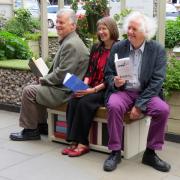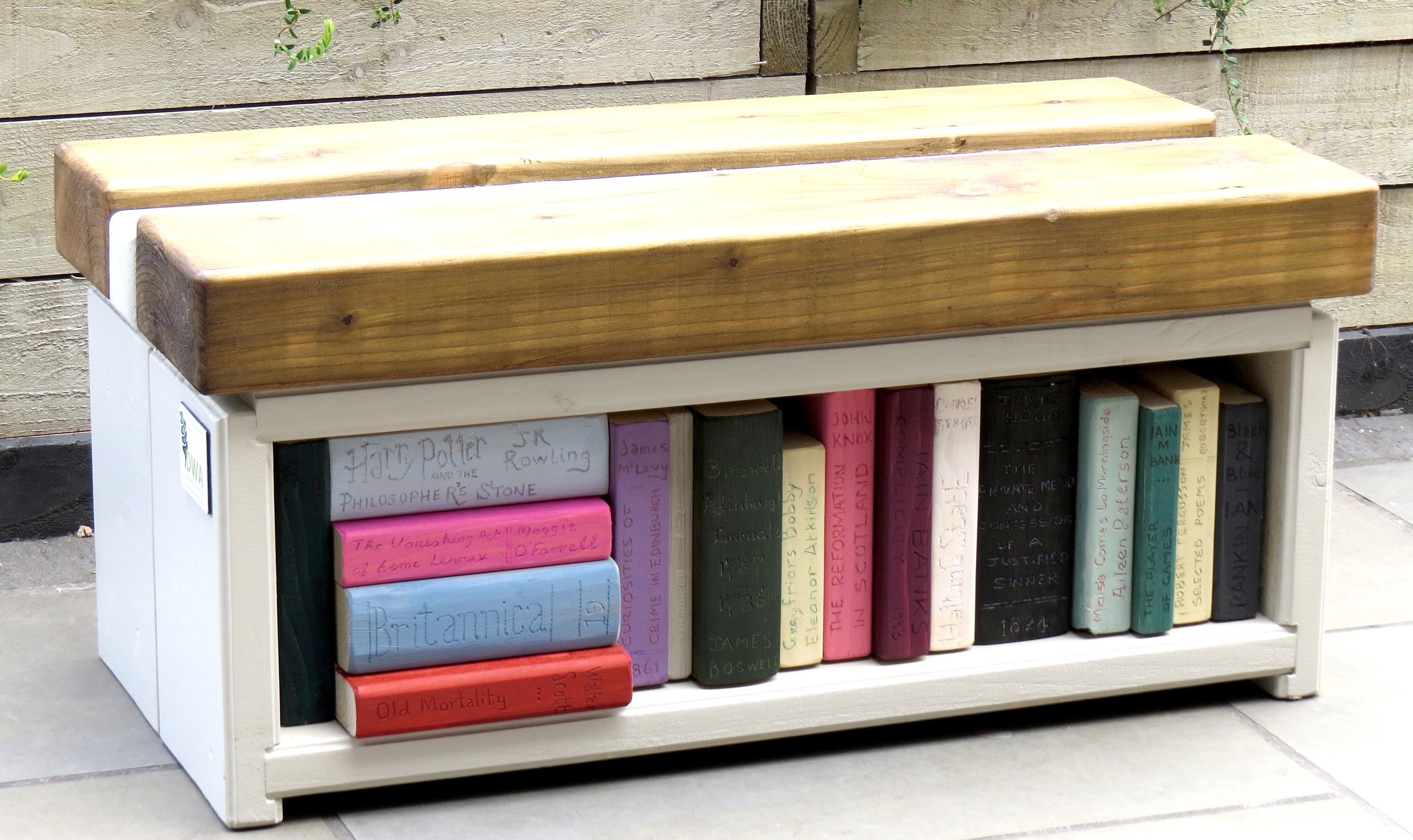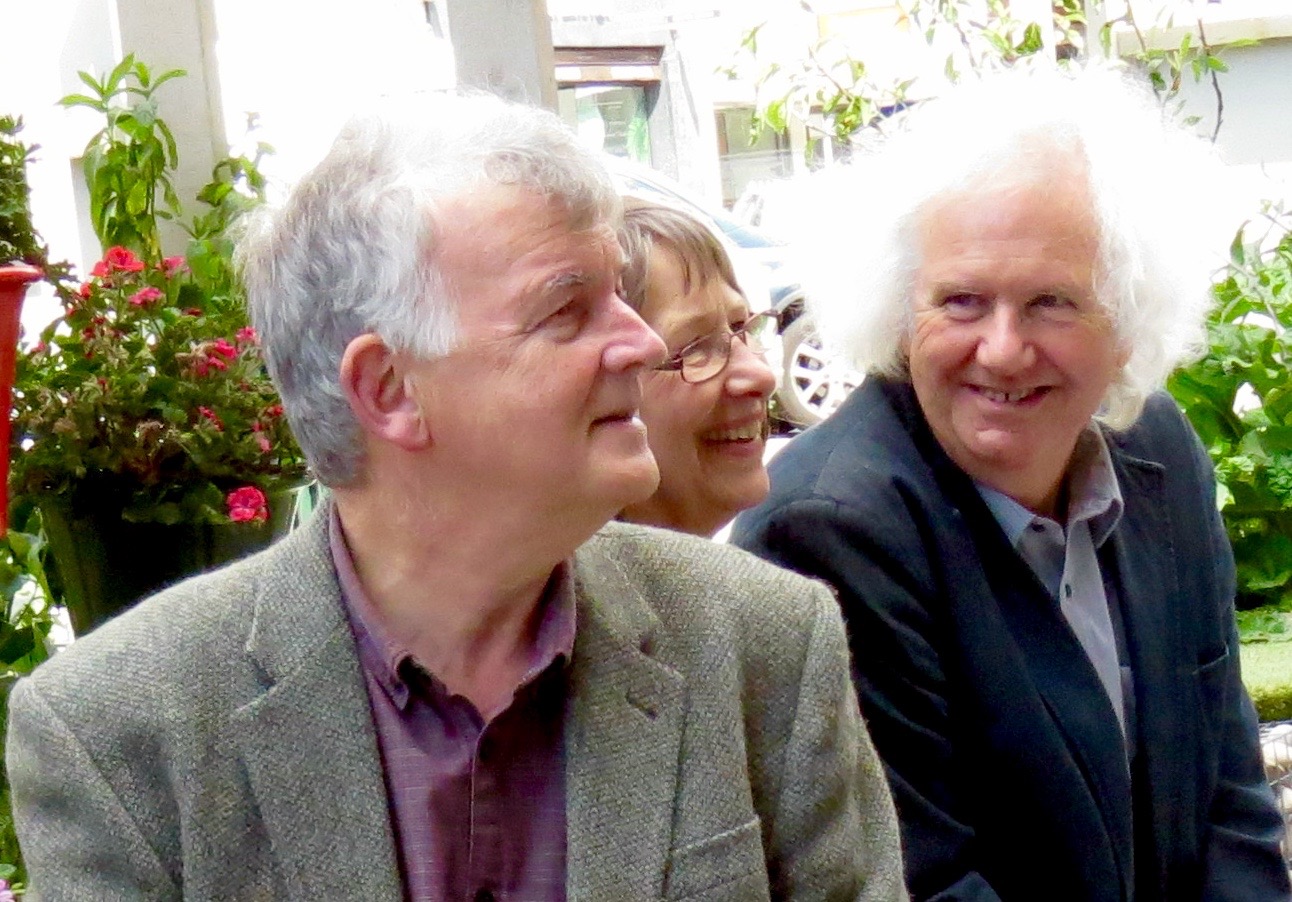
Three Scottish literati helped publicise the arrival of new sculpture-benches on George Street yesterday, smiling for the media and drawing bemused stares from passing tourists.
Author Ken MacLeod, librarian and editor Lizzie MacGregor, and former Edinburgh Makar Ron Butlin posed outside the Assembly Rooms where two of the benches – featuring UNESCO City of Literature Trust’s top-40 Edinburgh titles – will be installed.
The other two will be positioned outside Waterstone’s on the opposite side of the road. All four will tour other parts of the city later in the year. They were hand-crafted by Bespoke Design's Peter Graham with the support of DWA Landscape Architects.

The convenient (and, we can report, comfortable) new seating arrangements are a partial response to the remarks of stakeholders consulted in the last year over George Street’s present and future.
In a press release issued later, Transport convener Councillor Lesley Hinds said, ‘It was suggested by interested groups including members of the public and local businesses that more seating would be welcomed for those just wanting to take in the stunning Georgian architecture and relax with some essential Edinburgh reading’.
Paradoxically, the absence of Essential Edinburgh from the management of this initiative may be one reason why it looks like being a success.

This is the latest in a series of Council projects linking the city’s public realm, built heritage and UNESCO status. Others include the non-commercial West End sculpture space (currently featuring miniature Kelpies), and a pair of contrasting ‘Jekyll and Hyde’ urban gardens scheduled for the Old Town this autumn.
Top-40
Edinburgh became a UNESCO City of Literature in 2004. The Trust’s top-40 Auld Reekie reads are shown below. Eleven of them have Broughton connections, having been written or set here, or their authors having originated or been buried in the neighbourhood. Do you know which ones?
Fiction
44 Scotland Street (2004) by Alexander McCall Smith
Complicity (1993) by Iain Banks
The Fanatic (2000) by James Robertson
The Game of Kings (1961) by Dorothy Dunnett
The Prime of Miss Jean Brodie (1961) by Muriel Spark
Trainspotting (1993) by Irvine Welsh
The Vanishing Act of Esme Lennox (2006) by Maggie O'Farrell
Classic Fiction
Waverley (1814) by Sir Walter Scott
The Private Memoirs and Confessions of a Justified Sinner (1824) by James Hogg
Strange Case of Dr Jekyll and Mr Hyde (1886) by Robert Louis Stevenson
Noctes Ambrosianae (1820 – 1835) by John Wilson et al.
Marriage (1818) by Susan Ferrier
The Expedition of Humphrey Clinker (1771) by Tobias Smollett
Non-fiction
A Treatise of Human Nature (1740) by David Hume
Edinburgh: Picturesque Notes (1878) by Robert Louis Stevenson
Encyclopaedia Britannica
Theory of the Earth (1788) by James Hutton
History of the Reformation in Scotland (1586–1587) by John Knox
Mary Queen of Scots (1969) by Antonia Fraser
The Silent Traveller in Edinburgh (1948) by Chiang Yee
Curiosities of Crime in Edinburgh (1861) by James McLevy
Royal Edinburgh: Her Saints, Kings, Prophets and Poets (1890) by Margaret Oliphant
Boswell's Edinburgh Journals 1767–1786 by James Boswell
Poetry
Robert Fergusson Selected Poems (2007) edited by James Robertson
The Poems of Norman MacCaig (2005) edited by Ewen McCaig
The Ever Green (1724) by Allan Ramsay
The Magicians of Edinburgh (2012) by Ron Butlin
Luckenbooth: An Anthology of Edinburgh Poetry (2007) edited by Lizzie MacGregor
Crime
Body Politic (1997) by Paul Johnston
Fatal Last Words (2009) by Quintin Jardine
Black and Blue (1987) by Ian Rankin
Case Histories (2004) by Kate Atkinson
Children’s
Harry Potter and the Philosopher’s Stone (1997) by J.K. Rowling
Fleshmarket (2003) by Nicola Morgan
Maisie Comes to Morningside (1984) by Aileen Paterson
Greyfriars Bobby (1912) by Eleanor Atkinson
A Child's Garden of Verses (1885) by Robert Louis Stevenson
Science-Fiction
The Night Sessions (2008) by Ken MacLeod
Player of Games (1989) by Iain M. Banks
Halting State (2007) Charles Stross
Those Broughton connections explained:
1. Alexander McCall Smith’s 44 Scotland Street is set in the non-existent house of that number. It is thought to have been based on the adjacent No. 46.
2. Irvine Welsh was born at 13 Canonmills in 1957.
3. James Hogg’s wife is buried in Warriston Cemetery, and one of his sons – also buried there – lived on Dundas Street.
4. Mr Patrick Neill features in the Noctes Ambrosianae’s ‘Chaldee Manuscript’, there described as ‘a lean man, which hath his dwelling by the great pool to the north of the New City’ . (Neill lived on today’s Rodney Street, overlooking Canonmills Loch.)
5. Archibald Constable, publisher of Scott’s Waverley, is buried in Old Calton Burial Ground.
6.–8. Robert Louis Stevenson was born at 8 Howard Place, and later lived at 1 Inverleith Terrace and 17 Heriot Row. He was first schooled in Canonmills.
9. Ron Butlin’s ‘Reclaiming St Andrew Square’ (from The Magicians of Edinburgh) appeared with the poet’s permission in the Spurtle earlier this year.
10. Stevenson’s A Child’s Garden of Verses features his maternal grandfather’s garden in Colinton. The latter was one of the Balfours of Pilrig.
11. Charles Stross is a local resident.

